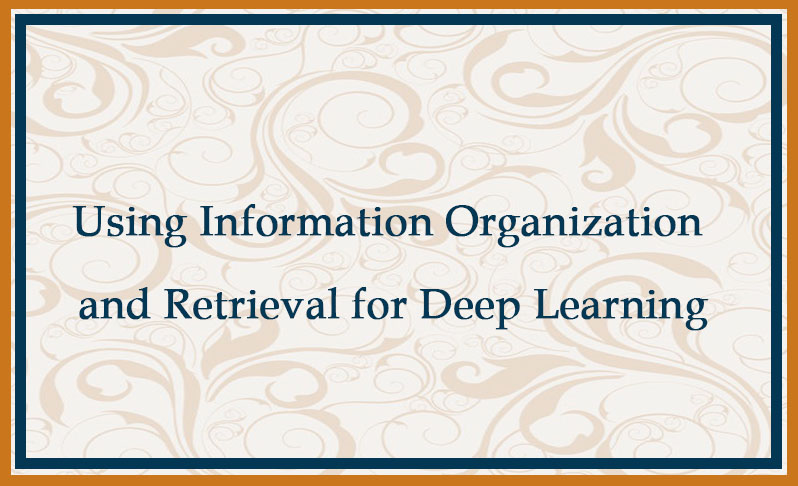In Achieving Excellence in Teaching (2014) we devote a chapter to the importance of organization in instruction, especially individual class organization. To help faculty teach, we have created C.R.I.S.P., “a classroom methodology based on unity of purpose as it organizing principle [that] involves five ordered and inter-related steps” (49-50):
- Contextualize: at the beginning announce the fundamental and powerful concepts around which the day’s instruction will revolve.
- Review: tie the day’s concept(s) to previously discussed ideas—i.e., students learn best when new knowledge is attached to old.
- Iterate: emphasize the key concept(s) several times throughout the class in a variety of ways.
- Summarize: at the end of class, stop in time to go over the key concept(s) whether through reminders, student recall, or reflection papers.
- Preview: when you assign the material for the next class, inform your students what they need to be looking for in the material.
Recently, we’ve been reading Brown, Roediger, and McDaniel’s Make It Stick (Cambridge: Harvard UP, 2014)—not to be confused with a book we cite in Achieving Excellence in Teaching, the Heath’s Made to Stick (2007)—whose subtitle encapsulates its premise: The Science of Successful Learning. What we found is a text chock full of learning techniques that supplement as well as reinforce C.R.I.S.P.
Written for both instructors and students, Make It Stick begins by debunking students’ traditional learning strategies of rereading text and massed practice of a skill. Instead, to aid in learning fundamental and powerful concepts, the authors point to the research in cognitive psychology underlying retrieval practice, “recalling facts or concepts or events from memory” (3). The more familiarity students gain from retrieving learning from memory, the closer they come to what we consider the goal of higher education, deep learning, or learning that endures, even changing one’s mental model of the world. According to Make It Stick, retrieval practice has two profound benefits:
- “One, it tells you what you know and don’t know, and therefore where to focus further study to improve the areas where you’re weak.”
- “Two, recalling what you have learned causes your brain to reconsolidate the memory, which strengthens its connections to what you know and makes it easier for you to recall in the future” (20).
Practicing retrieval, the authors conclude, “makes learning stick far better than reexposure to the original material does” (28).
To iterate and summarize, Brown, Roediger, and McDaniel suggest several methods for the student and instructor:
- Flashcards (they both strengthen the memory and interrupt forgetting)
- Quizzing (after reading or at the end of class). We have always advocated giving a daily quiz that is part of the student’s grade (around 20%) so something is at stake.
- In Achieving Excellence in Teaching, we cover this concept under “Summarize” (52).
- Elaboration, the “process of giving new material meaning by expressing it in your own words and connecting it with what you know “(5), something we discuss under “Iterate” (51).
- Putting new knowledge into a larger context (see our “Contextualize”).
In addition, the authors add several refinements to the retrieval strategy:
- Spacing—rather than one large cram session, use multiple sessions so that some forgetting has taken place. For the teacher, this method means that every reference to a key concept is not contained in one five-minute block; instead, periodically return to the crux of the session.
- Feedback—immediately after a quiz, go over the correct answer. Flashcards work on the same principle because when they are turned over, the user can tell whether the correct version was given (for that matter, always speak out loud when employing flashcards so that the user can’t simply say, “I knew that.” Our buddy Dee Fink, author of Creating Significant Learning Experiences (2003), offers a modern alternative to the traditional flashcard with the scratch-off forms that like scratch-off lottery cards provide immediate confirmation or denial of one’s answer.
- Interleaving—although it sounds counterintuitive, practice retrieval with two or more subjects. The gains will be slower at first, but what you learn will last longer.
- Varied practice—practice at different times, in different places, and with flashcards use different orders.
Our C.R.I.S.P., then, becomes even more effective as a class organizing methodology when instructors create questions, quizzes, and written reflections that call on the student to constantly retrieve information.
Author
 Ph.D Hal Blythe writes literary criticism to mystery stories. In addition to the eleven books he’s published with New Forums, Hal has collaborated on four books on a variety of subjects, over 1000 pieces of fiction/nonfiction, and a host of television scripts and interactive mysteries performed by their repertory company. He is currently co-director of the Teaching and Learning Center for Eastern Kentucky University. Meet Hal Blythe.
Ph.D Hal Blythe writes literary criticism to mystery stories. In addition to the eleven books he’s published with New Forums, Hal has collaborated on four books on a variety of subjects, over 1000 pieces of fiction/nonfiction, and a host of television scripts and interactive mysteries performed by their repertory company. He is currently co-director of the Teaching and Learning Center for Eastern Kentucky University. Meet Hal Blythe.



